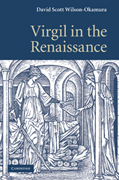
The disciplines of classical scholarship were established in their modern form between 1300 and 1600, and Virgil was a test case for many of them. This book is concerned with what became of Virgil in this period, how he was understood, and how his poems were recycled. What did readers assume about Virgil in the long decades between Dante and Sidney, Petrarch and Spenser, Boccaccio and Ariosto? Which commentators had the most influence? What story, if any, was Virgil's Eclogues supposed to tell? What was the status of his Georgics? Which parts of his epic attracted the most imitators? Building on specialized scholarship of the last hundred years, this book provides a panoramic synthesis of what scholars and poets from across Europe believed they could know about Virgil's life and poetry. INDICE: Introduction; Part I. Publication: 1. Virgil with an i; Part II. Reputation: 2. Patronage and the Eclogues; 3. Variety and the Georgics; 4. Morals and minimalism; Part III. Interpretation: 5. Virgil's Odyssey; 6. Virgil's Iliad; Epilogue; Appendix A. Virgil commentaries (alphabetical); Appendix B. Virgil commentaries (ranked).
- ISBN: 978-0-521-19812-7
- Editorial: Cambridge University Press
- Encuadernacion: Cartoné
- Páginas: 299
- Fecha Publicación: 12/08/2010
- Nº Volúmenes: 1
- Idioma: Inglés
